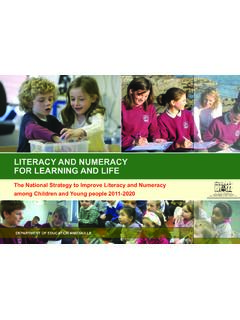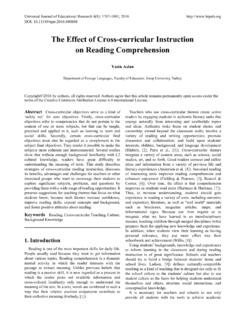Transcription of Moving English forward - GOV.UK
1 Moving English forward Action to raise standards in English This report sets out to answer the question: how can attainment in English be raised in order to move English forward in schools? It is recommended to all who teach the subject, those who lead the subject, and headteachers of primary and secondary schools. The findings are based principally on evidence from inspections of English between April 2008 and March 2011 in 268 maintained schools in England. Part A highlights the main strengths and weaknesses in English and presents the evidence from the survey inspection visits. Part B draws on this inspection evidence to analyse 10 areas of weakness and recommend appropriate action to improve practice in each area.
2 Age group: 4 19 Published: March 2012 Reference no: 110118 The Office for Standards in Education, Children's Services and Skills (Ofsted) regulates and inspects to achieve excellence in the care of children and young people, and in education and skills for learners of all ages. It regulates and inspects childcare and children's social care, and inspects the Children and Family Court Advisory Support Service (Cafcass), schools, colleges, initial teacher training, work-based learning and skills training, adult and community learning, and education and training in prisons and other secure establishments. It assesses council children s services, and inspects services for looked after children, safeguarding and child protection.
3 If you would like a copy of this document in a different format, such as large print or Braille, please telephone 0300 123 1231, or email You may reuse this information (not including logos) free of charge in any format or medium, under the terms of the Open Government Licence. To view this licence, visit , write to the Information Policy Team, The National Archives, Kew, London TW9 4DU, or email: This publication is available at To receive regular email alerts about new publications, including survey reports and school inspection reports, please visit our website and go to Subscribe . Piccadilly Gate Store Street Manchester M2 7LA T: 0300 123 1231 Textphone: 0161 618 8524 E: W: No.
4 110118 Crown copyright 2012 Contents Executive summary 4 Key findings 5 Recommendations 6 Part A 7 Standards and achievement in English 7 Quality of teaching and learning 12 Quality of the curriculum 20 Leadership and management 33 Part B: Moving English forward 38 Action to raise standards in English 40 Notes 56 Further information 57 Publications by Ofsted 57 Other publications 57 Annex A: Schools visited 58 Moving English forward : action to raise standards in English March 2012, No. 110118 4 Executive summary There can be no more important subject than English in the school curriculum. English is a pre-eminent world language, it is at the heart of our culture and it is the language medium in which most of our pupils think and communicate.
5 Literacy skills are also crucial to pupils learning in other subjects across the curriculum. Recent reports from Ofsted on English have focused on good practice. The previous triennial report included a section that identified the features of outstanding provision in English and, since then, Ofsted has published a series of case studies of schools that achieved excellence in This survey also found much effective practice in English in the schools visited. However, standards are not yet high enough for all pupils and there has been too little improvement in primary schools. Consequently, this report sets out to answer the question: how can attainment in English be raised in order to move English forward ?
6 The report is based on evidence from inspections of English between April 2008 and March 2011 in 133 primary schools, 128 secondary schools and four special schools in England, supplemented by three additional good practice visits. It also draws on evidence from six college inspections, other reports published by Ofsted, discussions with teachers and others, and national test and examination results. It reviews developments in the subject in the three years since Ofsted s previous English Around 70% of schools inspected in this survey were judged to be good or outstanding in English . This reflects the high profile the subject enjoys in schools, the emphasis placed on raising standards in English and the impact of substantial recent training and support.
7 However, these positive findings also reflect in part the choice of schools for the survey since the sample did not include schools that were in special measures or had been given a notice to improve. Although the quality of provision was broadly similar for primary and secondary schools, there was not enough outstanding teaching in primary schools. Since 2008, attainment in English has risen in secondary schools. There has also been improvement in the proportion of children who are secure in all aspects of communication, language and literacy at the end of the Early Years Foundation Stage. This has not yet carried through into Key Stage 1 where too many pupils failed to secure the basic reading and writing skills expected at that stage.
8 Standards in English at the end of Key Stage 2 have also not risen since the last report. While four-fifths of pupils at Key Stage 2 reached national expectations over the last three years, one in five primary pupils did not achieve the expected standard in English . Far more pupils failed to achieve this standard in writing and the report links this with weaknesses in the teaching of writing and gaps in the subject knowledge of some English coordinators in primary schools. 1 Excellence in English (100229), Ofsted, 2011; 2 English at the crossroads (080247), Ofsted, 2009; Moving English forward : action to raise standards in English March 2012, No.
9 110118 5 Although GCSE results have improved, nearly 30% of students who are entered for GCSE English do not achieve grades A* to C. Across all phases, girls continue to outperform boys in English . Those pupils who are known to be eligible for free school meals continue to achieve less highly in English than those pupils who are not eligible. In addition, the government s White Paper, The importance of teaching, makes it clear that floor standards in English need to rise still further and surveys suggest that standards have slipped in comparison with our international This report is in two parts. Part A highlights the main strengths and weaknesses in English and presents the evidence from the survey inspection visits.
10 Part B takes forward the findings from Part A to analyse 10 areas of weakness and identify the actions that would help to improve practice in these areas and contribute to higher standards of English in schools. Key findings Attainment in English has risen in secondary schools since 2008, but there has been only limited improvement overall in attainment in English in primary schools. A large majority of schools in the sample were judged to be good or outstanding in English . Around 30% were no better than satisfactory. Provision was broadly the same across primary and secondary schools, although there was more outstanding practice in secondary schools. An increasing number of children were assessed as being secure in communication, language and literacy in the Early Years Foundation Stage (EYFS).













